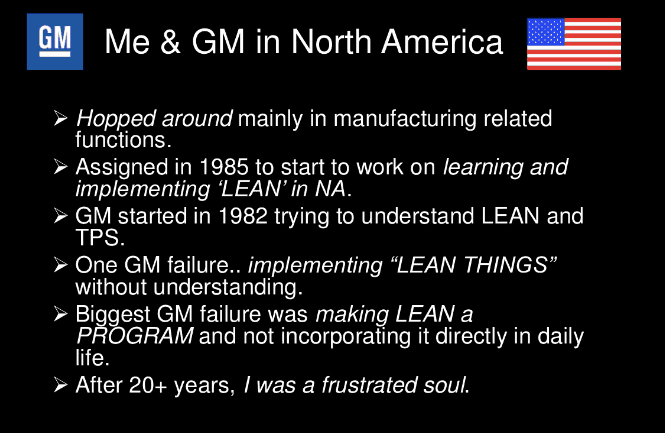Recently, when I posted a bit from the old 1984 NUMMI Team Member Handbook (more still to come on that), it allowed me to connect with Tom Wilson, a retired GM leader who spent time at NUMMI in the 1980s.
In looking through his LinkedIn profile, I saw some slides he posted about lessons learned from his career.
This jumped out at me:

This all seems so familiar 30 years later.
The full context of his slide:

I can understand why he was frustrated.
Organizations, in healthcare and other industries, too often implement Lean tools (Lean things) without understanding the intent (what problem are you solving?) and the underlying philosophy of the tools.
This often leads to situations that are L.A.M.E., not Lean.
Too many organizations today still often view Lean as a program.
It's too often:
- Training for front line staff and managers (as if the problem is them)
- Projects and events
- Tools and random “implementations”
Why is that still so common today? Why doesn't healthcare learn from the lessons and mistakes made in manufacturing and other industries?
Because we're different?
Tom added some comments to my post about this on LinkedIn:
“It's easier to try to implement THINGS and say “yep, we did it” than it is to change people's thinking and corporate mindset! Plus, when you make it a separate EVENT rather than trying to incorporate “lean” into the daily work, it's much easier! Implement visual controls for example! Easy to see….. but WHY?”
and
“The “THINGS” or “PROCESSES” are very important , but mean nothing unless the organization understands WHY and embraces the changes! Many times LEAN is looked at as a threat…. to jobs, the old methods of doing things and the security the old methods bring! Keys are WHY WHY WHY they need to be done and how does the organization benefit!”
Asking “why?” is certainly a good Lean habit.
How else can we learn more from the lessons of GM and NUMMI? See these past posts:
NPR on the “End of the Line” at NUMMI and My Story About an Interviewee
https://www.leanblog.org/2016/07/podcast-256-steve-bera-reflections-on-nummi-and-lean-part-1/
https://www.leanblog.org/2016/08/podcast-259-steve-bera-reflections-on-nummi-and-lean-part-2/
Yesterday, at Mary Greeley Medical Center in Iowa, we heard people who get it – those who bemoan Lean as tools… they realize Lean is not just a program. As somebody said, “Once you label it a program, employees will tune out since they think it's another program of the month.”
Their CEO doesn't just support Lean, he understands that safety and quality start with him. That gives Mary Greeley a huge advantage that many health systems don't have.
I'll blog more about this event soon, too, but here's one picture. You can see more quotes at #iowalean on Twitter.
Thank you @MarkGraban & @MaryGreeley for teaming up to bring Kaizen Live! to the ILC Membership today! #iowalean pic.twitter.com/32OF9jgcHZ
— Iowa Lean Consortium (@IowaLean) October 25, 2016
Please scroll down (or click) to post a comment. Connect with me on LinkedIn.
Let’s work together to build a culture of continuous improvement and psychological safety. If you're a leader looking to create lasting change—not just projects—I help organizations:
- Engage people at all levels in sustainable improvement
- Shift from fear of mistakes to learning from them
- Apply Lean thinking in practical, people-centered ways
Interested in coaching or a keynote talk? Let’s start a conversation.










From LinkedIn:
Great post. asking Why is a very simple step that so many managers and leaders miss.
Toyota Seniors as very good at asking the right questions in the right order particularly after a problem .
‘Why’
‘What have we learnt’
‘Could this problem / opportunity exist anywhere else. ( Yokoten )
These 3 questions are always repeated and are also the basis of the summary of A3 reports.
This technique is not industry specific. It is a very simple management process that improves safety, quality, delivery and ultimately cost.
If you would like to know a little more about ‘YOKOTEN’ I have recently posted a short blog that may help.
http://lmacuk.co.uk/the-art-of-yokoten
If I remember correctly at NUMMI GM had a plant manager at NUMMI, more than one over time . However Toyota was running the plant.
Toyota had Effectiveness.
GM had Efficiency.